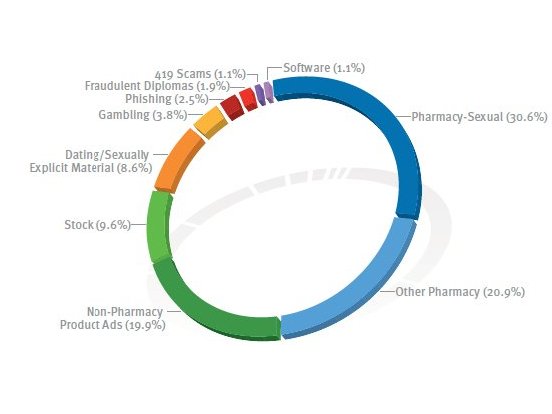Viagra adverts top spam rankings
Nigerian princes well behind pills and gambling

Sign up for breaking news, reviews, opinion, top tech deals, and more.
You are now subscribed
Your newsletter sign-up was successful
It probably won't come as a surprise to anyone to discover that the most common spam emails are those selling drugs like Viagra – making up over half of the total for unwarranted mail.
According to Microsoft's latest Security Intelligence Report, more than 51 per cent of all spam is pharmaceutical in nature, with 30.6 per cent selling sexual drugs and 20.9 per cent other medicines.
Those infamous 419 scams – mails from people purporting to be Nigerian princes and so on – makes up 1.1 per cent of the total, adding to other phishing scams (2.5 per cent) and advertising for fake diplomas (1.9 per cent).
The research suggests that only 8.6 per cent of spam is 'dating/sexually explicit' with non-pharmaceutical ads accounting for just under a fifth of the total.
Empasse
Microsoft believes that the latest figures suggests that neither side has got the upper hand in the spam wars adding:
"Overall, the amount of spam that successfully evades the blocking and filtering techniques used by services like Windows Live Hotmail and EHS to land in users' inboxes has decreased dramatically from its peak a few years ago, though the trend has been much flatter over the last year or two, indicating a state of rough equilibrium between spammers and e-mail services.
Sign up for breaking news, reviews, opinion, top tech deals, and more.
"This should not be taken as a sign that the pace of advancement and adaptation has slowed on either side, but rather that both spammers and spam fighters continue to adapt to new techniques deployed by their opponents, creating a complicated sort of stalemate in which neither side has managed to gain the upper hand."

Patrick Goss is the ex-Editor in Chief of TechRadar. Patrick was a passionate and experienced journalist, and he has been lucky enough to work on some of the finest online properties on the planet, building audiences everywhere and establishing himself at the forefront of digital content. After a long stint as the boss at TechRadar, Patrick has now moved on to a role with Apple, where he is the Managing Editor for the App Store in the UK.